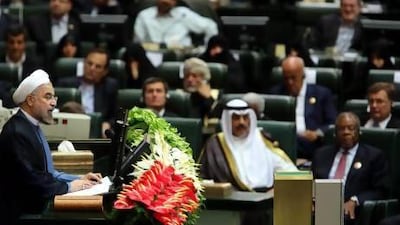Iran's new president, Hassan Rouhani, took the oath of office before parliament yesterday vowing to seek peace and stability in the "turbulent" region.
Mr Rouhani urged the West to abandon the "language of sanctions" and insisted dialogue was the only way for the international community to interact with Iran on its nuclear programme. Western countries say Iran wants to build a nuclear weapons capability, a charge Tehran denies.
Mr Rouhani, a moderate religious figure who unexpectedly trounced hardline candidates in June's election, has raised hopes abroad of a political rapprochement between Tehran and the West.
Yesterday, he insisted repeatedly that "moderation" would be the cornerstone of his government of "wisdom and hope". The new president also took his first steps towards governance with the nomination of several cabinet ministers, including a Washington-educated foreign minister.
Mr Rouhani formally assumed office at a ceremony on Saturday in which he received the endorsement of Iran's supreme leader, Ayatollah Ali Khamenei, but his inauguration yesterday was a much more high-profile event.
Millions of Iranians watched live on television and 10 heads of state and representatives from more than 40 countries, including the UAE, attended the ceremony.
It was the first time since Iran's 1979 Islamic revolution that foreign leaders were invited to a presidential inauguration, reflecting Mr Rouhani's desire to bring his country in from the cold.
Iran became increasingly isolated during the stormy, eight-year tenure of his pugnacious and polarising predecessor, Mahmoud Ahmadinejad.
Mr Rouhani, 64, has argued that a breakthrough in Iran's nuclear negotiations with six world powers, including the United States, is vital to reviving the country's sanctions-strapped economy.
But he stressed yesterday there was a need to negotiate "on equal grounds, reciprocal trust-building, mutual respect and reducing hostilities". To cheers from the parliament, he proclaimed Iran would "not surrender to sanctions, nor be threatened by war".
Mr Rouhani was Iran's chief nuclear negotiator a decade ago when Tehran came closest to a deal with the West on its atomic programme. He has backed Iran's right to a civilian nuclear programme while criticising his predecessor's confrontational style on the issue.
Although Ayatollah Khamenei retains the final say on all strategic issues, including the nuclear talks, Mr Rouhani promised at the weekend to do his utmost to ease crippling western sanctions.
Underlining his sense of urgency, he introduced his cabinet picks to parliament yesterday, despite having another two weeks to do so.
The conservative-dominated house now has 10 days to review his nominations, many of them western-educated technocrats.
Signalling his focus on the economy, Mr Rouhani's first appointment was a US-educated businessman, Mohammad Nahavadian, 58, as his chief of staff.
In what observers saw as an olive branch to Washington, he chose Mohammad Javad Zarif, a well regarded US-educated former ambassador to the United Nations, as his foreign minister.
He nominated Bijan Zanganeh to return as oil minister, a post he held in the government of Iran's reformist president Mohammad Khatami from 1997 to 2005.
Mr Rouhani also proposed Mahmoud Alavi, a cleric and former lawmaker, as minister of intelligence and Hossein Dehghan, a former commander in the powerful Revolutionary Guards, as defence minister.
Attending yesterday's ceremony was the European Union's former foreign policy chief, Javier Solana, who represented world powers in nuclear talks with Tehran in the past. In an interview published by Iran's reformist Shargh newspaper yesterday, he described Mr Rouhani as "a politician with insight … with whom one can do business".
The White House said last night that Mr Rouhani would find "a willing partner" in Washington if his government decided "to engage substantively and seriously" in honouring its international obligations and worked towards a peaceful solution to the nuclear issue.
* Additional reporting by the Associated Press

